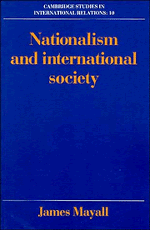Book contents
- Frontmatter
- Contents
- Acknowledgements
- Introduction
- 1 The search for the international system: the problem of theory
- 2 The society of states
- 3 Nationalism and the creation of states
- 4 Nationalism and the international order
- 5 Economic nationalism and the liberal world order
- 6 The new economic nationalism
- 7 Post-colonial nationalism
- 8 The third world and international society
- Conclusion
- Notes
- Index
6 - The new economic nationalism
Published online by Cambridge University Press: 05 July 2011
- Frontmatter
- Contents
- Acknowledgements
- Introduction
- 1 The search for the international system: the problem of theory
- 2 The society of states
- 3 Nationalism and the creation of states
- 4 Nationalism and the international order
- 5 Economic nationalism and the liberal world order
- 6 The new economic nationalism
- 7 Post-colonial nationalism
- 8 The third world and international society
- Conclusion
- Notes
- Index
Summary
At the height of the great depression in 1934, Maynard Keynes argued that governments should, so far as possible, pursue policies of national self-sufficiency. Keynes was not a romantic nationalist – indeed, his instincts were unashamedly those of a cosmopolitan intellectual – but he was convinced that, in the absence of effective international machinery, national governments had to take unilateral action to overcome the problem of mass unemployment and to lay to rest the spectre of communist revolution to which it had given rise throughout the capitalist world. He also believed that, if governments intervened in the economy to raise the level of effective demand, they could resolve the problem.
By 1945, most western politicians and intellectuals, including Keynes himself, were convinced that any revival of economic nationalism would threaten the new international order to which they were committed. The proliferation of tariff wars, competitive devaluations and other ‘beggar-your-neighbour’ policies during the 1930s, was widely seen as having contributed to the economic failure of the industrial countries and, politically, to the rise of fascism and the drift to war. It is by no means certain that this belief was well founded; but, as in other areas of international relations, this hardly matters, it was the perception that counted. In any event, the central objective of the economic peacemaking on which the western allies embarked in 1942, was to construct a system of economic cooperation between states which would provide insurance against such a revival.
- Type
- Chapter
- Information
- Nationalism and International Society , pp. 88 - 110Publisher: Cambridge University PressPrint publication year: 1990

